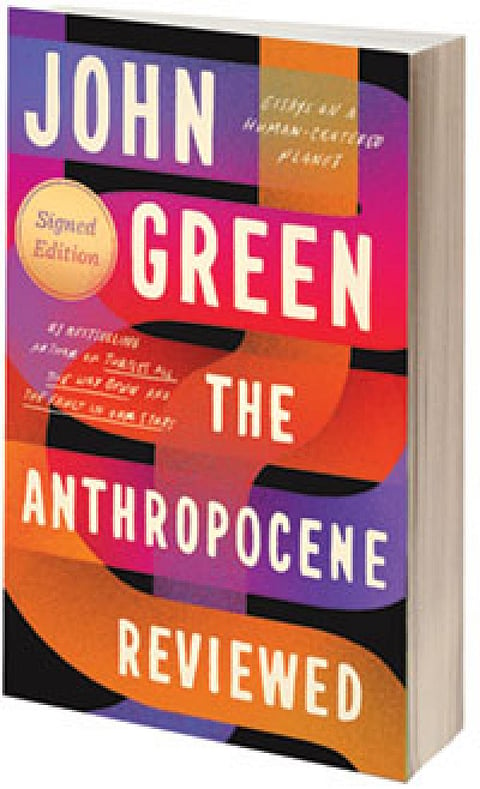Glorious oversight: Reviewing our very own epoch
“Mongols are the Exception!” was the running gag in a 2012 YouTube series titled Crash Course World History. It was more ironical than funny because if the writers and producers of the show had actually understood “world” history they would not have labelled Mongols as an exception but as continuation of a culture that developed in a markedly different context and environment than the European empires.
Why bring up this West-centric bias in understanding of the world here? The reason is John Green, the producer and anchor of the aforementioned well-produced, adequately hilarious, geopolitically unnuanced YouTube series, who has now labelled his musings about American pop culture fixtures and privileged way of life as review of the Anthropocene.
The Anthropocene Reviewed is Green’s foray into non-fiction. He is otherwise famous as the author of the young-adult best-seller novel The fault in our stars. The book is collection of 44 personal essays that cover topics ranging from the mundane (“Sunsets”) to the topical (“Plague”) to the enigmatic (“Mountain goats”) to the alien, at least to the average Indian (“Diet Dr Pepper”).
One ought to wonder how these do justice to the book’s lofty strapline “essays on a human-centred planet”. Well, they do not. But they are crafted intelligently to engage the uninformed and the uninterested to maybe start a dinner conversation about themselves. Or at best, make them marginally appreciate some inventions like the internet and vaccines that literally altered the human growth projectile on the planet.
This is achieved by extending tech-obsession with star-rating-scale to human experiences. People have become addicted to rating products, clients, places on the internet and most make their decisions just by referring the simplistic star-ratings. These are not scientific ratings, but Green has cunningly used the online generation’s addiction to star-ratings to tell his story (somewhat unfairly though).
Green rates each of the subjects on a scale of five stars at the end of the essay and has awarded a five-star rating to almost 20 per cent of the subjects he has reviewed. All the five-star rated topics are happy experiences like watching the sunset or sycamore trees.
None of these are really the doing of human actions or have impacted the planet as implied by the term “Anthropocene”. Only three things in his collection get a one-star rating and all three are diseases or disease-causing artefacts—Staphylococcus aureus, viral meningitis, and plague. None of the developing world’s horrors like malaria, hunger, or poverty are under review in the book.
Written during the 2020 pandemic lockdowns, the essays are an outgrowth of the namesake podcast which Green started in 2018. Green has masterfully weaved encyclopaedic information about his assortment of human experiences, many a time making provident remarks like in the essay on “air conditioning”. He notes: “I need to get used to feeling a bit warmer. It’s the only future for us.”
While reviewing Staphylococcus aureus—a round bacterium that happens to be one of the most common causes of bacteremia and infective endocarditis—Green digs deep into the history of antibiotics.
It is a fascinating story on its own, even without Green’s pondering over philosophical question “why life wants to be”. What stands out is a passing mention that “antibiotic resistance is not a problem for the future-this year, some fifty thousand people in the U.S. will die of Staphylococcus aureus infections.”
Now that is something of real concern in the Anthropocene—the ability of the smallest of organisms to evolve to neuter threats to their survival. Something which the variants of COVID-19 in past two year have effectively demonstrated.
This careless caressing of grave threats to human existence while dancing about first-world experiences is a constant in all the essays of the book. I am not sure if this was intentional. Still, the book makes for an interesting read.
In fact it is very easy to miss these dire observations while leisure-reading this well-produced, adequately hilarious and passive bragging. But for a concerned human there is ample to actually ponder about, especially the fact that so many of us think of these mundane subjects as defining feature of humans’ impact on the planet.
While reviewing “Hiroyuki Doi’s circle drawing”, which got a four-star rating, Green writes “…I was trying to realise some ideal form that I have in my head of what my signature looks like, and I can never quite achieve it”.
The sentence is a brilliant and succinct review of his own book. Honouring the “brilliant” five-star-rating-scale theme, I give The Anthropocene Reviewed three-and-a-half stars, which also happens to be Green’s average rating of things in the book.
This was first published in the 16-28 February, 2022 edition of Down To Earth


